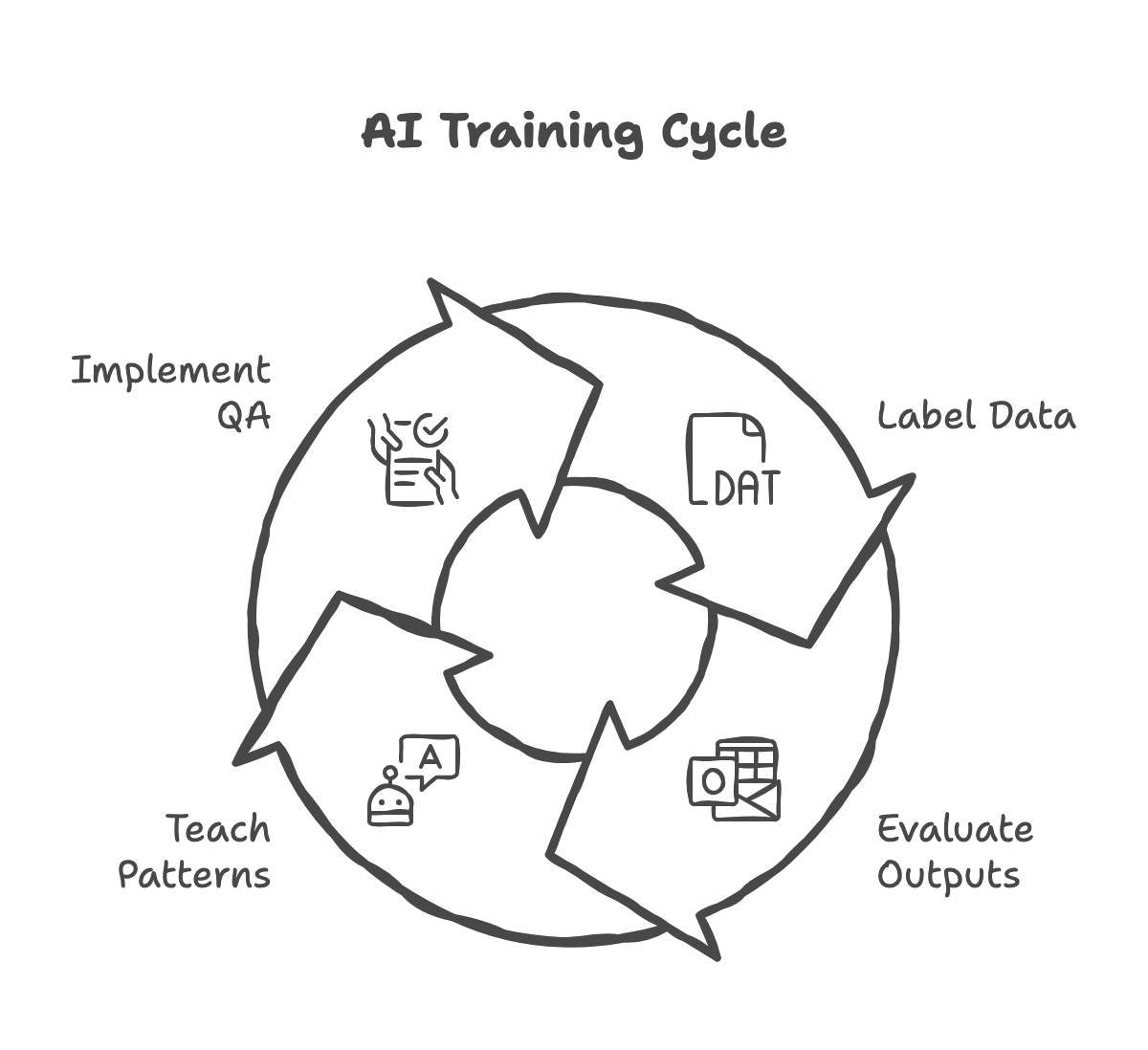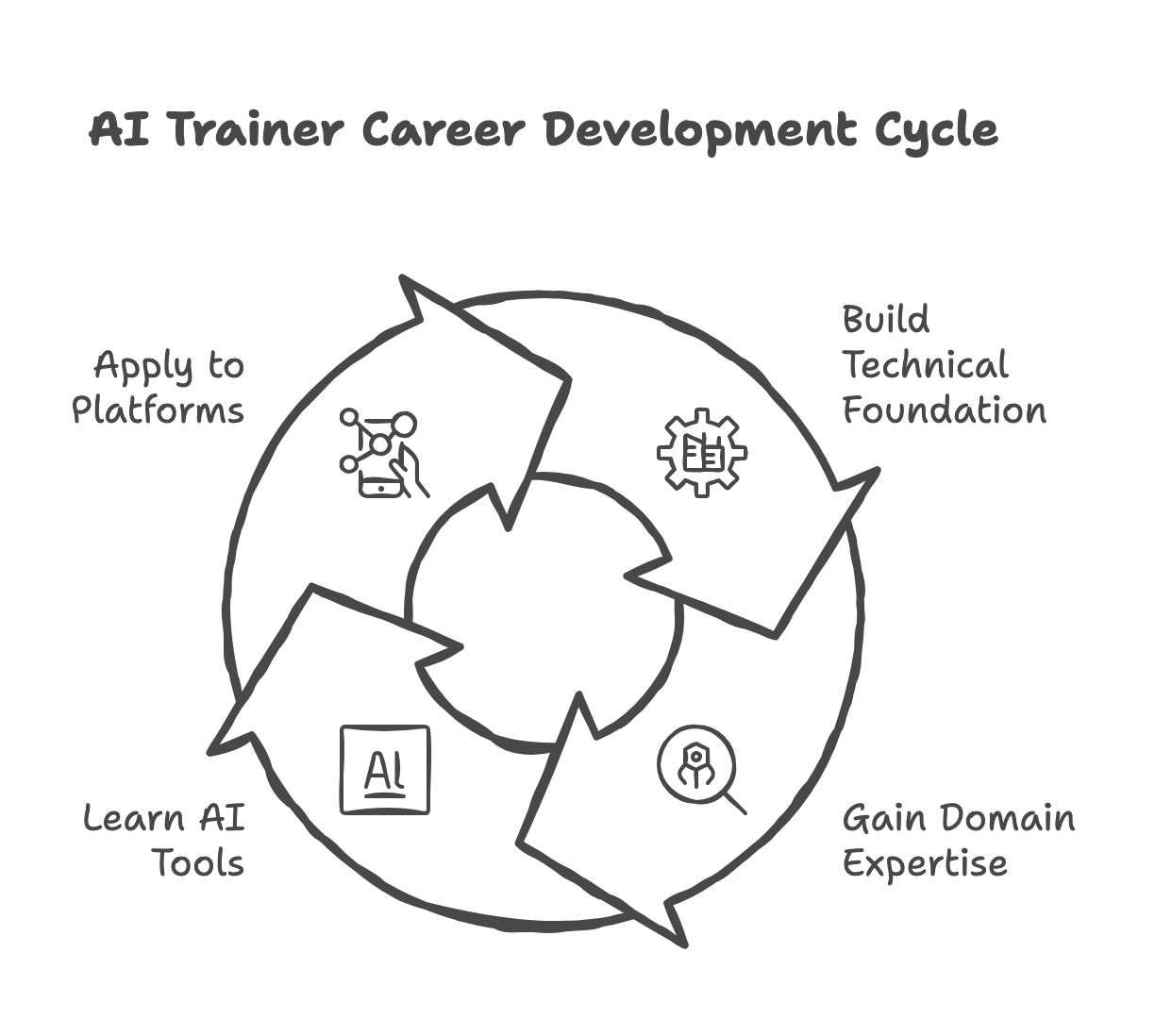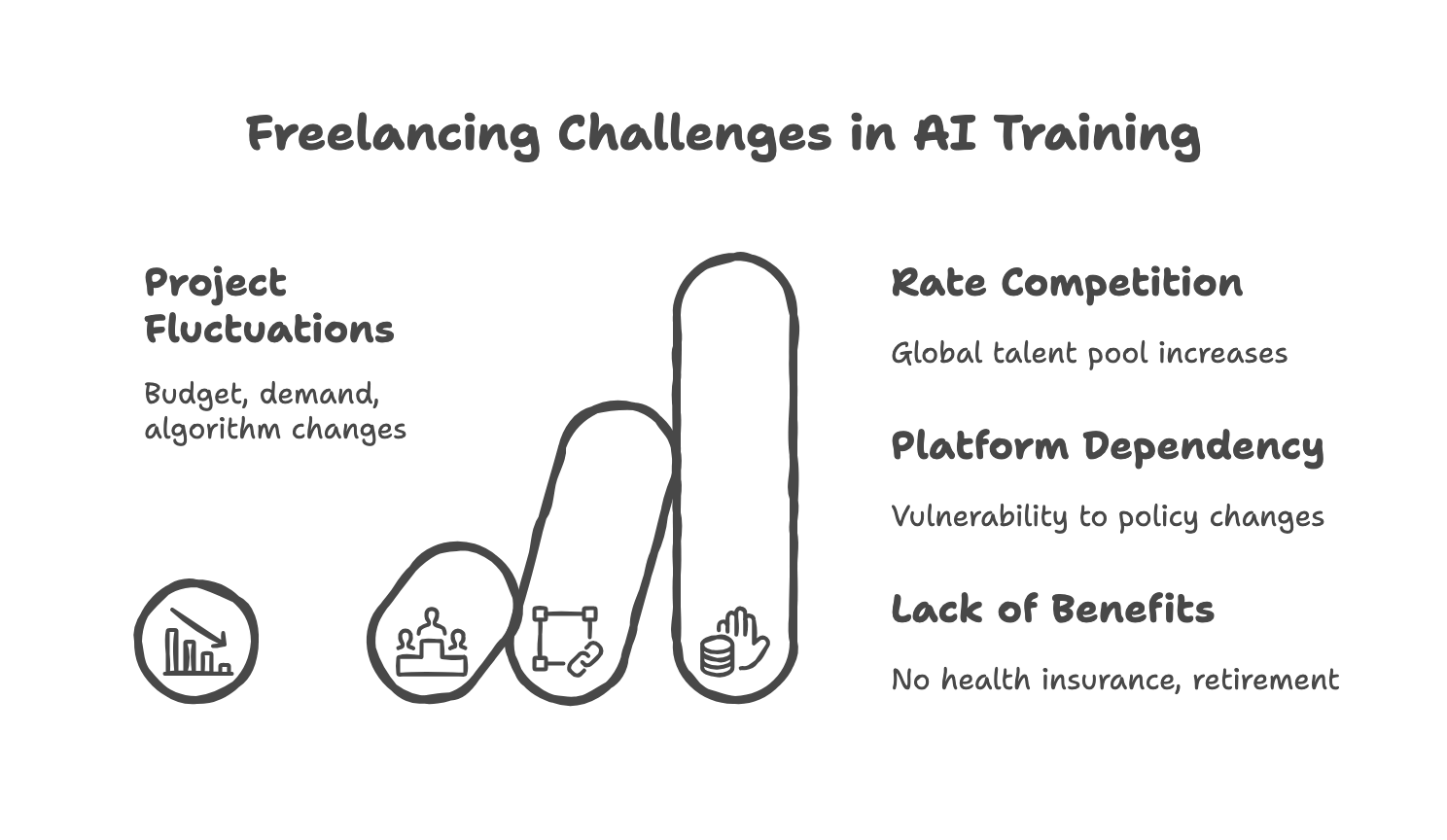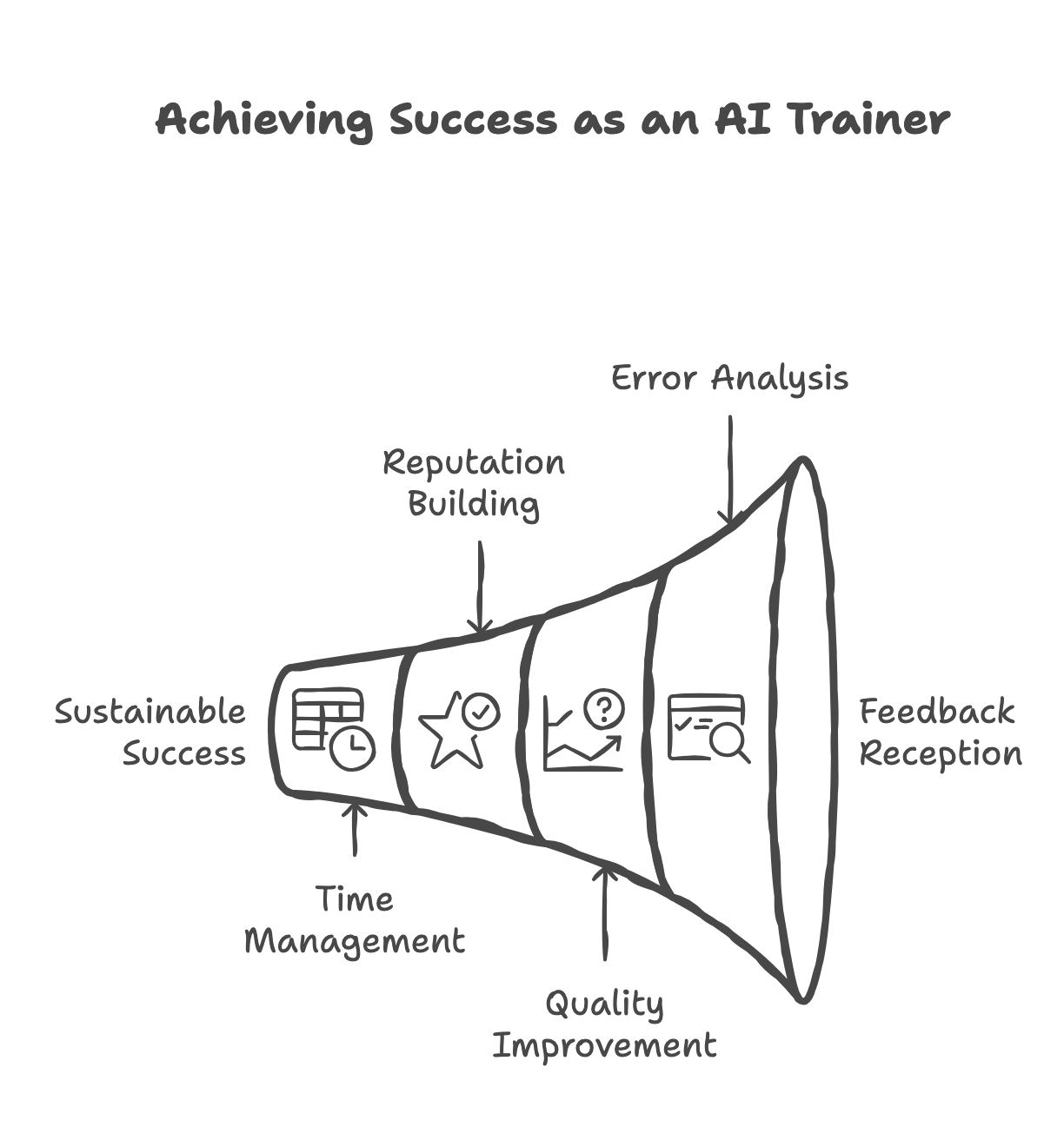What Does an AI Trainer Do?
An AI trainer teaches artificial intelligence systems how to understand, process, and respond to human inputs accurately. Unlike data scientists who build algorithms or engineers who develop infrastructure, AI trainers focus on the quality and accuracy of model outputs through hands-on training and evaluation.
• Your resume analyzed for free, opportunities delivered
Think of it as teaching a student: you provide examples, correct mistakes, and ensure understanding. AI trainers label data sets, evaluate model responses, and provide feedback that helps machine learning models learn patterns and improve their performance over time.
Core Responsibilities of AI Trainers
- Labeling and annotating data to create training sets that teach models to recognize patterns, whether in text, images, or audio
- Evaluating AI-generated outputs to ensure responses are accurate, unbiased, and aligned with user expectations
- Teaching conversational patterns to chatbots and virtual assistants, helping them respond effectively to customer queries
- Implementing quality assurance checks to identify errors, biases, or inconsistencies in model behavior before deployment

Daily Tasks and Project Types
Your day might involve reviewing chatbot conversations to improve customer service interactions, transcribing and labeling audio files for voice recognition systems, or evaluating image recognition accuracy for computer vision projects. Some trainers focus on prompts engineering, crafting inputs that test how well generative AI models understand complex requests.
The work varies based on your domain expertise. A mathematical modeler might train AI on quantitative analysis, while someone with language skills could work on multilingual chatbot development. Each project requires you to apply your specific knowledge to help models learn field-specific nuances.
| Project Type | Primary Task | Skills Required | Time Commitment |
|---|---|---|---|
| Conversational AI | Teaching chatbots natural dialogue patterns | Language expertise, customer service understanding | 10-20 hours/week |
| Image Recognition | Labeling objects, scenes, facial expressions | Visual attention to detail, domain knowledge | 15-25 hours/week |
| Audio Transcription | Converting speech to text, identifying speakers | Language proficiency, listening accuracy | 5-15 hours/week |
| Prompts Evaluation | Testing AI responses to complex queries | Critical thinking, technical writing | 10-30 hours/week |
Essential Skills Required for AI Trainers
According to LinkedIn's Economic Graph research, AI talent demand has grown 32% year-over-year, making this an opportune moment to develop relevant skills. The role requires a blend of technical knowledge and professional judgment.
Technical Skills and Expertise
Python programming forms the foundation for many AI training tasks, allowing you to understand how models process inputs and generate outputs. Familiarity with data analysis tools helps you spot patterns in training data and identify areas where models struggle. You don't need to be a software engineer, but understanding basic machine learning concepts—how models learn from examples, what constitutes quality training data—proves essential.
Domain expertise matters more than many candidates realize. An AI trainer with medical knowledge brings value that generic technical skills cannot replace. Your specific background—whether in finance, law, science, or creative writing—becomes your competitive advantage. Models need experts who can teach them field-specific accuracy and avoid domain-related errors.
- Analytics capabilities to measure model performance and track improvement over time
- Understanding of machine learning models and their limitations
- Technical writing skills to document processes and create clear evaluation criteria
- Platform-specific tools knowledge for the systems you'll use daily
Professional and Soft Skills
Attention to detail separates exceptional AI trainers from average ones. A single mislabeled data point in a training set of thousands might seem insignificant, but it can teach models incorrect patterns. You need patience to review outputs carefully, checking for subtle errors that others might miss.
Critical thinking helps you evaluate whether an AI response truly answers the user's intent or just sounds plausible. Can you identify when a model generates accurate information versus when it creates convincing-sounding nonsense? This skill develops with practice but requires intellectual honesty and skepticism.
Communication with teams and clients ensures everyone understands quality standards and project goals. As a freelancer, you'll often work remotely, making clear written communication vital for collaboration and feedback.
How to Become an AI Trainer
Educational Background and Degree Requirements
Most platforms require at least a bachelor's degree in data science, computer science, information technology, engineering, or related fields. However, the "related fields" category is broader than you might expect. Degrees in linguistics, mathematics, psychology, or even creative writing can qualify you if combined with relevant technical skills.
A master's degree opens doors to higher-paying specialized roles, particularly for quantitative analyst positions or mathematical modeler opportunities. Advanced degrees signal deeper expertise that clients value for complex projects.
Do you need a specific degree to start? Not always. Some platforms accept candidates who demonstrate expertise through certifications, portfolios, or professional experience. A career changer with strong domain knowledge and self-taught technical skills can compete effectively.
Step-by-Step Career Path
- Build your technical foundation by learning Python basics, understanding machine learning concepts, and familiarizing yourself with data analysis principles through online courses
- Gain domain expertise in a specific field where AI applications are growing—healthcare, finance, legal tech, customer service, or your current professional area
- Learn AI tools and platforms by taking courses on prompt engineering, natural language processing, or computer vision depending on your interests
- Apply to platforms like Outlier, Mindrift, or TrainAI communities, emphasizing both your technical skills and domain specialization
Career changers should leverage their existing expertise. A former teacher brings valuable insights for educational AI applications. A customer service professional understands conversational nuances that improve chatbot quality. Your current career isn't a barrier—it's potentially your strongest asset.

Certifications and Online Courses
Google Career Certificates offer field-specific AI skills training that employers recognize. These programs teach practical applications of artificial intelligence across various industries, helping you understand how to implement AI solutions effectively.
Coursera provides comprehensive AI trainer courses from universities and companies actively developing machine learning technology. Many offer flexible schedules that fit around current employment, allowing you to learn while maintaining income stability.
Free resources include YouTube tutorials, GitHub projects, and open-source documentation. Paid programs typically offer more structured learning paths and recognized credentials. Consider your learning style: do you need structured assignments and deadlines, or can you self-direct through free materials?
AI Trainer Job Opportunities and Platforms
The World Economic Forum's Future of Jobs Report projects AI could create 97 million new jobs globally, with AI training roles forming a significant portion of this growth. The market continues expanding as more companies implement artificial intelligence solutions.
Top Platforms to Find AI Training Jobs
Outlier connects freelancers with clients building AI systems, offering opportunities across multiple domains. The platform emphasizes expert human input, seeking specialists who can shape the next generation of models through quality feedback. Projects range from coding evaluation to creative content assessment.
Mindrift positions itself as a flexible remote opportunity rather than a traditional job. The platform matches freelancers interested in training AI models with clients developing artificial intelligence applications. You maintain control over your schedule while accessing diverse project types.
TrainAI community provides full training for success, making it accessible to newcomers without extensive AI backgrounds. The community focuses on data-related freelance work, offering remote, part-time opportunities that fit various schedules and experience levels.
| Platform | Project Focus | Flexibility | Entry Requirements | Estimated Pay Range |
|---|---|---|---|---|
| Outlier | Domain-specific expertise (coding, writing, STEM) | High - choose projects | Bachelor's degree + expertise | $15-$50/hour |
| Mindrift | Generative AI training, prompt evaluation | Very high - set schedule | Relevant experience | $20-$40/hour |
| TrainAI | Data labeling, model evaluation | Medium - project-based | Training provided | $12-$30/hour |
| Indeed | Various AI training roles | Varies by employer | Depends on position | $18-$45/hour |
| ZipRecruiter | Remote AI training positions | Employer-specific | Professional background | $20-$50/hour |
Remote and Freelance Opportunities
Work from home advantages extend beyond convenience. You eliminate commute time, reduce expenses, and access global opportunities regardless of your geographic location. International candidates can work with companies worldwide, expanding your potential client base beyond local markets.
Flexible scheduling lets you balance AI training with other commitments. Many trainers work evenings or weekends, fitting projects around full-time jobs or family responsibilities. Projects often have deadlines rather than fixed hours, allowing you to structure your day as productivity peaks and valleys dictate.
Can you balance AI training with another full-time job? Yes, though it requires realistic expectations. Most platforms allow 5-20 hours weekly, making AI training an excellent side income source. However, building to full-time sustainability requires gradually expanding your project load and client base.
Is AI Trainer a Sustainable Full-Time Career?
Long-Term Viability Analysis
The current market shows strong demand for AI trainers as companies rush to implement artificial intelligence across industries. However, sustainability depends on how you position yourself. Generative AI models are becoming more sophisticated, potentially reducing demand for basic data labeling while increasing need for expert evaluation and specialized training.
Models still require human judgment for nuanced tasks. An AI might generate grammatically correct text, but does it capture the appropriate tone for a specific audience? Does it avoid cultural insensitivities? These questions require human expertise that technology cannot yet replicate. Your role evolves from basic training to quality assurance and specialized refinement.
Gartner predicts that more than 80% of enterprises will have used generative AI APIs or deployed generative AI-enabled applications by 2026. This massive adoption creates ongoing opportunities for trainers who can ensure these implementations meet quality standards and serve users effectively.
Income Stability and Growth Potential
Income varies significantly based on expertise and domain specialization. Entry-level trainers performing basic data labeling might earn $12-20 hourly, while experts with specialized knowledge command $40-60 or more. Mathematical modelers, quantitative analysts, and domain specialists in fields like medicine or law typically earn higher rates.
Career progression involves developing deeper expertise in specific AI applications. You might start with general chatbot training, then specialize in customer service AI for healthcare, becoming the go-to expert for medical conversational systems. This specialization creates pricing power and consistent project flow.
Challenges and Limitations
- Project availability fluctuations based on client budgets, seasonal demand, and platform algorithm changes
- Rate competition from global talent pools, particularly for entry-level tasks that don't require specialized expertise
- Platform dependency creates vulnerability—relying on a single source for all projects leaves you exposed to policy changes
- Lack of traditional benefits like health insurance, retirement contributions, or paid time off that full-time employment provides
Strategies to ensure sustainable income include diversifying across multiple platforms rather than depending on one source. Build direct client relationships when platform terms allow. Develop skills in emerging AI areas before they become saturated. Consider AI training as part of a broader freelancing portfolio rather than your sole income stream.

Building a Freelancer Portfolio
Diversification protects against platform changes or market shifts. Work with 3-4 different platforms simultaneously, ensuring projects from multiple sources. If one platform reduces available work, others maintain your income baseline.
Develop niche expertise that distinguishes you from general AI trainers. Perhaps you combine finance knowledge with AI training, becoming an expert in training models for banking applications. Or you leverage teaching experience to specialize in educational AI. Your unique background creates opportunities that pure technical skills cannot access.
Track your successful projects, quality ratings, and client feedback. Build a professional profile that demonstrates your expertise and reliability. On platforms like Whileresume, a well-crafted profile showcasing your domain knowledge and AI training experience helps recruiters find you for specialized opportunities.

Salary Expectations and Pay Structure
Average Rates Across Platforms
Hourly rates form the most common payment structure, ranging from $12 for basic data labeling to $60+ for specialized expert evaluation. Some platforms offer project-based pay, where you earn a fixed amount for completing specific tasks regardless of time invested. This structure rewards efficiency but requires accurate time estimation to ensure adequate compensation.
The U.S. Bureau of Labor Statistics projects employment for data scientists—a category that includes AI trainers—to grow 36% through 2033, much faster than average for all occupations. This growth supports strong salary trends as demand outpaces supply.
| Experience Level | Typical Hourly Rate | Monthly Income (20 hrs/week) | Required Skills |
|---|---|---|---|
| Entry-Level | $12-$20 | $960-$1,600 | Basic technical understanding, attention to detail |
| Intermediate | $20-$35 | $1,600-$2,800 | Domain expertise, proven quality record |
| Expert | $35-$60+ | $2,800-$4,800+ | Specialized field knowledge, advanced technical skills |
| Specialized Roles | $50-$80+ | $4,000-$6,400+ | Rare expertise (medical, legal, quantitative modeling) |
Factors Affecting Your Pay Rate
- Domain specialization in high-value fields like healthcare, finance, or legal services commands premium rates over general knowledge
- Language skills create opportunities for multilingual projects, particularly for languages with smaller talent pools
- Technical complexity of tasks—evaluating advanced model architectures pays more than simple data labeling
- Quality ratings on platforms directly impact your access to higher-paying projects and preferred status
Geographic considerations matter less for remote work, but international candidates should verify payment methods and tax implications. Some platforms pay in specific currencies or use payment processors that charge conversion fees. Understanding these practical details prevents surprises when receiving your first payments.
Building a strong reputation through consistent, accurate work opens access to premium projects. Platforms often tier opportunities, reserving high-paying tasks for trainers with proven track records. Your initial projects might pay less, but they build the ratings that unlock better opportunities.

Different Roles Within AI Training
Specialized AI Trainer Positions
Quantitative analyst roles combine financial expertise with AI training, teaching models to understand market patterns, risk assessment, and numerical analysis. These positions require strong mathematical backgrounds and often pay $40-70 hourly due to specialized knowledge requirements.
Mathematical modeler positions involve training AI systems on complex mathematical concepts, from calculus to statistical modeling. If you have advanced degrees in mathematics, physics, or engineering, these roles leverage your expertise while offering flexibility that academic positions often lack.
Language-specific trainers work on projects requiring native-level fluency in particular languages. Japanese speakers, for example, find opportunities training conversational AI for Japanese markets. Multilingual candidates can access projects across different language pairs, expanding their project availability beyond English-only opportunities.
Industry-Specific Applications
Customer service chatbot training focuses on teaching AI systems how to handle common inquiries, resolve complaints, and maintain appropriate tone throughout interactions. Your experience in customer-facing roles becomes valuable expertise, helping models learn the nuance between technically correct responses and truly helpful ones.
Virtual assistant development involves training AI to manage scheduling, email triage, and task organization. This work requires understanding how people actually use productivity tools, not just how they theoretically should. Your own work habits and organizational strategies inform better training approaches.

Image recognition and computer vision projects need trainers who can accurately label objects, scenes, and actions in visual data. Medical image analysis, security applications, and autonomous vehicle development all require human trainers to teach models what they're seeing and verify their recognition accuracy.
Which field fits your background best? Consider where your current expertise intersects with AI applications. A lawyer might train legal research AI. A graphic designer could work on image generation quality. Your existing career creates relevant domain knowledge that technical skills alone cannot replicate.
The Future of AI Training Jobs
Grand View Research projects the global AI market will reach $1.81 trillion by 2030, indicating sustained growth and ongoing opportunities for professionals who can train and refine these systems. The industry's expansion suggests AI trainer roles will evolve rather than disappear.
Are AI Trainers Still Needed in 2025 and Beyond?
Models cannot yet evaluate their own outputs with human-level judgment. While AI can check grammar or flag obvious errors, it struggles with subjective quality assessment. Does this marketing copy resonate with the target audience? Is this medical advice appropriately cautious without being alarmist? These questions require human judgment informed by experience and cultural understanding.
Generative AI advances change the nature of training work. Instead of teaching models basic patterns, trainers increasingly focus on refinement, bias detection, and ensuring outputs meet ethical standards. The role shifts toward quality assurance and specialized teaching rather than foundational training.
Human expertise remains essential for establishing ground truth—the accurate reference points that models learn from. Particularly in specialized domains, only experts can determine what constitutes correct performance. An AI cannot teach itself medical diagnosis accuracy; it needs physicians to verify its conclusions and correct its errors.
Emerging Opportunities in AI Training
New project types emerge as AI applications expand into previously untouched areas. Creative AI tools need trainers who understand artistic principles. Emotional intelligence AI requires people who can evaluate empathetic responses. Scientific research AI demands specialists who can verify technical accuracy in their fields.
Growing demand across industries creates diverse opportunities. Healthcare organizations need trainers to ensure medical AI provides safe, accurate guidance. Financial institutions require experts who can teach AI systems to detect fraud while minimizing false positives. Educational technology companies seek trainers who understand pedagogical effectiveness.
- Healthcare applications ranging from diagnostic support to patient communication systems
- Finance and banking including fraud detection, investment analysis, and customer service automation
- Education technology encompassing personalized learning systems and automated assessment tools
- Legal tech applications for document analysis, research assistance, and contract review automation
Avoid Common Pitfalls
Scams targeting aspiring AI trainers have increased alongside legitimate opportunities. Red flags include platforms requiring upfront fees to join, promising unrealistic earnings, or lacking transparent information about client companies. Legitimate platforms never charge candidates to work.
Quality check processes protect both your reputation and your income. Before submitting work, review your outputs as if you're the client evaluating whether this training will improve their model. Did you follow all instructions precisely? Are your labels consistent with previous work? Small oversights accumulate into quality scores that affect future opportunities.
Verify that emails and webpages claiming to represent TrainAI, Outlier, or other platforms are official. Check domain names carefully—scammers create similar-looking sites to harvest personal information. Official communications come from verified email addresses, not free email services or slightly misspelled domains.
Getting Started: Practical Next Steps
Joining AI Training Communities
TrainAI community onboarding typically involves submitting an application demonstrating your qualifications, completing sample tasks to verify your capabilities, and reviewing training materials explaining platform expectations. The process might take several weeks from application to first project assignment.
Outlier requires you to showcase domain expertise during application, often through assessments testing your knowledge in specific fields. Mathematical modelers might solve complex problems, while writers submit samples demonstrating technical communication skills. The platform seeks specialists who can provide expert-level training.
Mindrift's application focuses on your availability and interests in AI training. The platform emphasizes flexibility, so clearly communicate your weekly time availability and preferred project types during signup. Honesty about your schedule prevents overcommitment and ensures realistic client expectations.
What to Expect on Day One
Onboarding typically includes video tutorials explaining platform navigation, quality standards, and payment procedures. Watch these carefully—understanding expectations upfront prevents mistakes that affect your quality scores. Most platforms offer practice tasks that don't affect your rating, allowing you to learn without pressure.
First task assignments often involve simpler projects to establish your baseline quality and working speed. Don't expect the most interesting or highest-paying projects immediately. Consider these early tasks as paid training where you learn platform specifics while earning.
Tips for Success as an AI Trainer
- Respond effectively to feedback by treating quality notes as learning opportunities rather than criticism
- Improve accuracy continuously by reviewing your errors and understanding why certain labels or evaluations were incorrect
- Build expert reputation through consistent, high-quality work that meets or exceeds platform standards
- Manage time efficiently by setting clear working hours and realistic project commitments that prevent burnout
Networking within communities provides insights into project types, rate negotiations, and platform changes that official communications might not emphasize. Many platforms have forums or chat groups where experienced trainers share strategies. Participate actively, ask questions, and learn from others' experiences.
Build relationships with project managers when possible. Responsiveness and professionalism in communications create positive impressions that lead to project preferences. When managers need reliable trainers for urgent or important tasks, they remember who consistently delivers quality work on time.

How Whileresume Connects AI Trainers with Opportunities
Finding consistent AI training work requires visibility to recruiters and companies seeking talent. Whileresume provides a platform where you can showcase your AI training expertise, domain specialization, and technical skills to employers actively seeking trainers for their projects.
Create a comprehensive profile highlighting your educational background, relevant certifications from platforms like Coursera or Google Career Certificates, and specific AI training experience. Detail your domain expertise—whether in healthcare, finance, technology, or other specialized fields—so recruiters can match you with appropriate opportunities.
The platform connects candidates with both freelance projects and full-time positions as companies increasingly hire dedicated AI trainers. Your profile remains visible to recruiters searching for specific skill combinations, creating passive income opportunities when you're not actively job searching.
Ready to shape the future of artificial intelligence? Establish your presence on Whileresume to ensure AI training opportunities find you. Your expertise in teaching machines to better serve people creates value for companies while building your career in this growing field.
